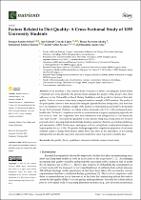Por favor, use este identificador para citar o enlazar este ítem:
https://repositorio.usj.es/handle/123456789/693
Registro completo de metadatos
| Campo DC | Valor | Lengua/Idioma |
|---|---|---|
| dc.contributor.author | Ramón Arbués, Enrique | - |
| dc.contributor.author | Granada López, José Manuel | - |
| dc.contributor.author | Martínez Abadía, Blanca | - |
| dc.contributor.author | Serrano, Emmanuel Echániz | - |
| dc.contributor.author | Antón-Solanas, Isabel | - |
| dc.contributor.author | Jerue, Benjamin Adam | - |
| dc.date.accessioned | 2021-11-17T12:56:03Z | - |
| dc.date.available | 2021-11-17T12:56:03Z | - |
| dc.date.issued | 2021-10-05 | - |
| dc.identifier.citation | Ramón-Arbués, E.; Granada-López, J.-M.; Martínez-Abadía, B.; Echániz-Serrano, E.; Antón-Solanas, I.; Jerue, B.A. Factors Related to Diet Quality: A Cross-Sectional Study of 1055 University Students. Nutrients 2021, 13, 3512. https://doi.org/10.3390/nu13103512 | es_ES |
| dc.identifier.issn | 2072-6643 | es_ES |
| dc.identifier.uri | https://repositorio.usj.es/handle/123456789/693 | - |
| dc.description.abstract | Given that there is only a limited body of evidence available concerning the dietary habits of Spanish university students, the present study assesses the quality of this group’s diet, their adherence to the National Food-Based Dietary Guidelines, and the predictive factors of their diet quality. To do so, a cross-sectional study was performed on a sample of 1055 students. The quality of the participants’ diets was then analysed by using the Spanish Healthy Eating Index, and then their level of compliance was assessed in light of the dietary recommendations put forth by the Spanish Society for Community Nutrition. According to these standards, only 17.4% of the participants had a healthy diet. The level of compliance with the recommendations was poor, highlighting especially the low levels of “fruit” and “vegetables” that they consumed as well as high levels of “cold meats and cuts” and “sweets.” The factors that predicted a worse diet are being male, living alone, low levels of physical activity, smoking, high alcohol intake, leading a sedentary lifestyle, psychological distress, and insomnia (p <0.005). Furthermore, participants with low or high body weights showed signs of a higher quality diet (p < 0.001). The present findings suggest that a significant proportion of university students ought to change their dietary habits; these also attest to the importance of developing strategies that are directly targeted at university students in order to promote a healthy diet. | es_ES |
| dc.format.extent | 15 | es_ES |
| dc.format.mimetype | application/pdf | es_ES |
| dc.language.iso | eng | es_ES |
| dc.publisher | MDPI | es_ES |
| dc.relation.requires | Adobe | es_ES |
| dc.rights | Atribución 4.0 Internacional | * |
| dc.rights.uri | http://creativecommons.org/licenses/by/4.0/ | * |
| dc.subject | Diet quality | es_ES |
| dc.subject | Dietary guidelines | es_ES |
| dc.subject | University students | es_ES |
| dc.subject | Cross-sectional study | es_ES |
| dc.title | Factors Related to Diet Quality: A Cross-Sectional Study of 1055 University Students | es_ES |
| dc.type | info:eu-repo/semantics/article | es_ES |
| dc.relation.publisherversion | https://www.mdpi.com/2072-6643/13/10/3512 | es_ES |
| dc.identifier.publicationfirstpage | 1 | es_ES |
| dc.identifier.publicationlastpage | 15 | es_ES |
| dc.identifier.doi | 10.3390/nu13103512 | es_ES |
| dc.rights.accessrights | info:eu-repo/semantics/openAccess | es_ES |
| Aparece en las colecciones: | Artículos de revistas | |
Ficheros en este ítem:
| Fichero | Descripción | Tamaño | Formato | |
|---|---|---|---|---|
| Factors Related to Diet Quality A Cross-Sectional Study of 1055 University Students.pdf | 860,23 kB | Adobe PDF |  Visualizar/Abrir |
Este ítem está sujeto a una licencia Creative Commons Licencia Creative Commons

